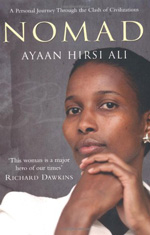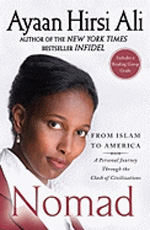
In Nomad, the 2010 follow up to her earlier memoir Infidel, human rights activist Hirsi Ali gives a brief update on her life since moving to the United States. Through telling her highly personal story, she develops her philosophy and discusses the efforts to ensure that "women everywhere, of all cultures, merit access to education and basic human rights."
In the first section of Nomad, she examines how members of her decidedly dysfunctional family all struggled and eventually failed to adapt to democratic society. I found the story of her brother especially interesting. In the absence of their father, at the age of ten he was the legal guardian of his mother while they lived in Saudi Arabia; yet despite this responsibility, no one prepared him to work toward realistic goals. As an adult he held grandiose ideas of himself but was never able to hold down a job. In their own way, every person in her family "focused backward to a mythical past of life as nomads." Instead of taking an active role in helping themselves, with the sigh Inshallah, "God willing," each of them passively resigned themselves to suffer. Initially, I wasn't particularly interested in these stories. But then I saw how she used them to illustrate the arguments she presents in Part III: Sex, Money, Violence.
She uses those three words to sum up what she considers to be the three obstacles to the integration of people like those in her own family. Violence and sex (by which she means the violation of women's rights) committed in the name of Islam are well known problems, of course. However, the section on money was an interesting angle that was new to me.
Even more interesting was Part IV: Remedies, especially her critique of the lack of action and deafening silence by too many Western feminists. She soundly refutes any claim that the subjugation of Muslim women is "folklore" that happens only in remote obscure villages in just a few countries: for example, 34 million females living in Iran are subject to a law that allows them to be married at age nine, and further, they may be sentenced to death by stoning for the transgression of adultery. In Pakistan, 82.5 million women can be beaten, jailed or killed for refusing to marry the man their families choose; in fact, according to the UN, around the world there are approximately 5,000 "honour" killings of girls and women each year. For many, the female body is the site of shame. Another extreme example of this is the practice of female genital mutilation, a violation suffered by 130 million women alive today. These are all behaviours that Hirsi Ali is taking a stand against: "all human beings are equal, but all cultures and religions are not." She speaks out loudly against cultural relativism, which is the belief that one should not impose our values on others and that one can only criticize her own. She believes in enlightenment over submission; critical reasoning over faith; evidence over tradition; and tears instead of blood. As she asserts:
Hirsi Ali is a remarkable human who is incredibly brave and intelligent. She is gifted at articulating her argument calmly, clearly and with great eloquence. Although she is controversial and has a vast number of detractors, I've yet to see anyone debate her who does not resort to ad hominem attacks, straw man arguments or other logical fallacies. Her ultimate goal is to end needless suffering—how can anyone argue with that?
For readers who haven't read Ayaan Hirsi Ali yet, I recommend reading Infidel first, as it gives the full picture
of her amazing life. But after you've learned about her childhood in a traditional Somali clan, her time in Saudi Arabia
and subsequent adoption of fundamentalist Islam while living in Kenya, and then her escape to Europe where she eventually
became a member of the Dutch parliament, I'm sure you'll want pick up Nomad too.


Simon & Schuster, paperback, 9781847376640
Free Press, paperback, 9781439157329
